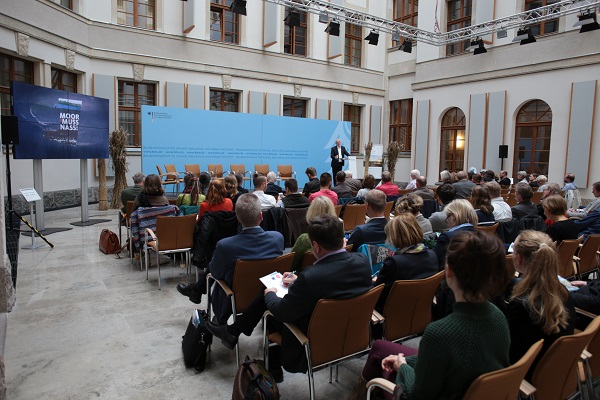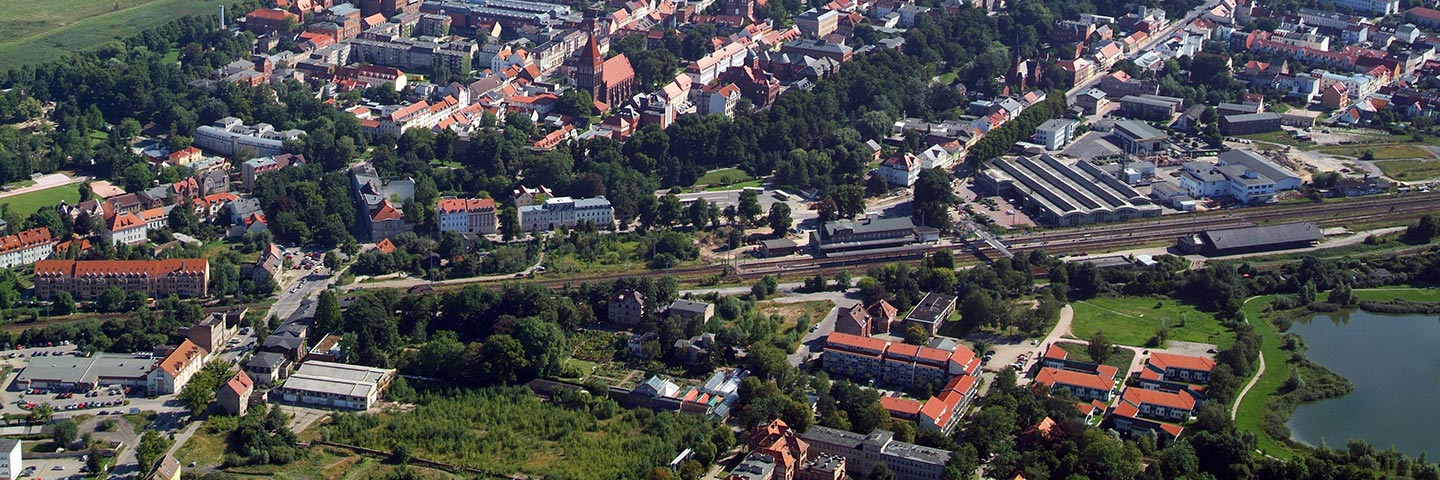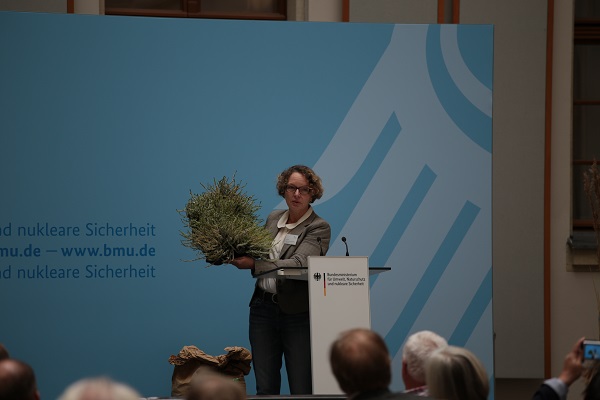News/All pieces
MoKli – work on the ground large scale
Joining forces with land users for solutions
27/03/19 The new project MoKli – abbreviated and merged from the German terms ‘Moor’ (peatland) and ‘Klima’ (climate) – wants to implement practical solutions for sustainable peatland use by joining forces with land users. For this new project University of Greifswald and the Succow Foundation, both partner in the GMC, team up with the German Association for Landcare (DVL).
While facts on peatland and climate are sufficiently known, action is now urgently needed: MoKli therefore develops strategies for climate friendly use of peatlands in Germany and their regional adaptations. The project conveys knowledge on peatlands and paludiculture to land owners and users and to local authorities, associations and enterprises in the fields of water management, agriculture and nature conservation.
In five peatland-rich federal states of Germany MoKli will develop and apply cooperative solutions in model regions at water (sub)catchment area level. Together with local stake-holders, new production methods for the utilisation of peatland biomass will be initiated. In addition, the project wants to create and promote the profession of the 'peatland carbon farmer' (German: Moor-Klimawirt) who delivers ecosystem services to society and is recognised for doing so. Jointly with political decision-makers at local, state, federal and EU level MoKli acts to improve framework conditions for peatland climate protection.
UN resolution on peatlands
Joint efforts during UN Environment Assembly
15/03/19 The United Nations Environment Assembly of the United Nations Environment Programme adopted during its 4th session in Nairobi 11–15 March 2019 a resolution on UNEP/EA.4/RES.16 ‚Conservation and Sustainable Management of Peatlands‘. Published in 6 languages, the resolution urges member states and other stakeholders to give greater emphasis to the conservation, sustainable management and restoration of peatlands worldwide. The GMC supported UN Environment staff with background information and text. The resolution also calls for more coordinated effort and will be followed up by a workshop with global conventions and organisations co-organised by BfN, UN Environment, GMC and Wetlands International in May.
Thawing permafrost: one of 5 largest environmental threats
UNEP Frontiers report based on GMC expertise
07/03/19 The new report Frontiers 2018/19: Emerging Issues of Environmental Concern issued by the United Nations‘ Environmental Organisation (UNEP) defines five pressing but hitherto underestimated environmental threats. Thawing Arctic permafrost is one of them. The chapter Permafrost Peatlands: Losing ground in a warming world is authored by Prof. Hans Joosten (GMC).
Besides detailled background information the chapter offers a new circumpolar map on the distribution of permafrost and Arctic peatlands based on the Global Peatland Database of the GMC. UNEP’s „Frontiers“ reports regularely address environmental threats of global implications which are not yet being sufficiently recognised and tackled/fought against. The report is being translated into six languages and made available to governments and environmental institutions worldwide.
BOnaMoor + DESIRE
New projects starting
20/02/19 The Greifswald Mire Centre is happy about two new paludiculture projects starting: BOnaMoor aims at optimising thermal utilisation of fen biomass. Peatland scientists and landscape ecologists of Greifswald University examine its growth and yields at the agricultural enterprise Voigt. They will also conduct an economic and financial assessment. Engineers of the Hochschule für Technik und Wirtschaft Berlin specialised on renewable energies analyse combustion at the heating plant Malchin as well as in the laboratory.
The project is funded by the Federal Ministry for Agriculture through the Fachagentur für nachwachsende Rohstoffe (FNR). The international project DESIRE develops sustainable peatland management for nutrient retention and other ecosystem services through restoration and paludiculture within the Neman River catchment. The project is part of the regional programme Interreg Baltic Sea and is coordinated by the GMC (Greifswald University and Succow Foundation). It supports politicians and other decision-makers in assessing their region’s paludiculture potential and in utilising peatlands sustainably. DESIRE develops pilot sites, fosters communication on wet peatland management and assesses it economically.
More moss for the GMC
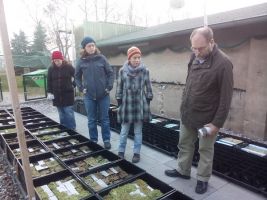
New peatmoss nursery established
17/12/18 Twelve peatmoss species are growing now in the new established nursery at the University of Greifswald. The project MOOSzucht intends to identify the species growing best under site conditions in (Northwest) Germany to reach high yields and produce large amounts of renewable biomass to substitute peat in horticulture. Nearly 500 samples of wild provenances across Europe – from Ireland to Estonia, from Sweden to Czech Republic and in Georgia – were collected within the MOOSzucht project as the base for research. Dr. Ulf Hauke from the German Federal Ministry for the Environment, Nature Conservation and Nuclear Safety, responsible for peatlands, visited the Greifswald Mire Centre on 17.12.18 including the new moss nursery.
Finally: permanent professorship!
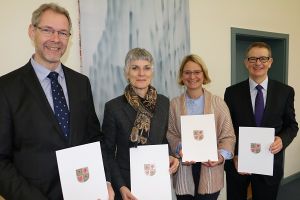
Greifswald peatland sciences enforced
17/12/2018 A new professorship of peatland sciences was agreed upon by the government of Mecklenburg-Western Pomerania and the University of Greifswald at 17th December. This gives a promising and reliable basis for future peatland sciences at Greifswald University, where peatland research started some 200 years ago and the university acts as a partner in the Greifswald Mire Centre since 2015. “The Greifswald peatland scientists analyse, how people and agriculture may make use of peatlands without exploiting them. This is what we want to support with a new professorship” explains Birgit Hesse, Minister of Education and Science in Mecklenburg-Western Pomerania. This state is one of Germany’s peatland-rich states. State and university are financing the new W3 professorship jointly with the Stifterverband der deutschen Wissenschaft (tbc) and the Michael Succow Foundation. Further information (German only) is provided in the the state’s press release and at the university’s website.
In the picture from left to right: Thomas Krüger (Chairman of the parliamentary group of SPD MV)), Prof. Dr. Johanna Eleonore Weber (Rector of Greifswald University), Birgit Hesse (Minister of Education and Science MV) and Dr. Jürgen Buchwald (State Secretary of Agriculture and Environment MV) (Foto: H. Lipski)]
Policy brief for COP24
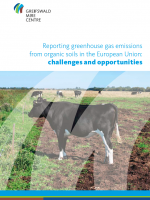
Reporting GHG emissions from organic soils in the EU
11/12/2018 Just in time for UNFCCC COP24 in Katowice, the Greifswald Mire Centre together with peatland scientists from 7 European institutions have produced a policy brief on reporting GHG emissions from organic soils in the EU. The brief covers the policy framework, weaknesses in reporting organic soils in National Inventory Submissions to UNFCCC, and recommendations for improvement. We have presented it at several events during UNFCCC COP24 in Katowice. The policy brief has been produced within the project INVESTIGATE funded under the European Climate Initiative (EUKI) of the German Federal Ministry for the Environment, Nature Conservation and Nuclear Safety (BMU). It has been co-ordinated by Alexandra Barthelmes (Greifswald Mire Centre).
Peatlands at COP24
Against peat fires and for the climate
10/12/2018 The Greifswald Mire Centre, together with partners from the Global Peatlands Initiative, co-organises several peatland events at the 2018 UNFCCC conference in Katowice. The side event „The trace of haze: Peat fires as local and global challenges“ at 6th December was coordinated by UN Environment and Greifswald Mire Centre, and hosted by the German Government. The session presented global experience on peat fires and showcased coalitions for peatland restoration, e.g. the Restoring Peatlands in Russia Project, which was awarded the UNFCCC “Momentum for Change” award in 2017. A side event at 7th December brought together multilateral environmental conventions such as Ramsar Convention, CBD, UNCCD and UNFCCC, and future joint action on peatlands was agreed. At 11th December, the lunch session „Stop eating peat“ co-organised by CMok, Wetlands International and GMC will bring attention of the Climate Hub Katowice to peatlands. We will also contribute to a side event on peatlands and Nationally Determined Contributions (NDC‘s) 12th December. Follow @greifswaldmoor on twitter for details on COP24!
Triple win for climate, people and the planet
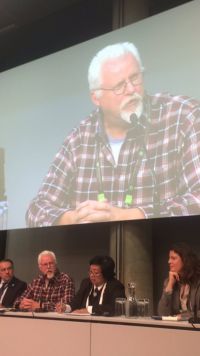
Tropical peatlands in focus at Global Landscape Forum
03/12/2018 Tropical peatlands are in focus of a high level event at the Global Landscapes Forum (GLF) 1st December 2018. With the Event Protecting Tropical Peatlands Together distinguished officials from the Republic of Congo, Indonesia, Germany and the Ramsar Convention joined forces for a better understanding of tropical peatlands and thus a better conservation and sustainable management. The session highlighted Indonesia and the Republic of Congo’s commitments to high level South South collaboration on management, restoration and protection of peatlands. Along with H.E. Siti Nurbaya, Minister of Environment and Forestry, Indonesia, and Arlette Soudan-Nonault, Minister of Environment and Tourism, Republic of Congo, also Hans Joosten (GMC) joined the session and shared his insights on priorities in peatland management. See the session here.
Strong signal from Berlin
Conference ‚Peatlands must be wet! Climate protection by peatland conservation‘
26/10/2018 ‚Peatlands must be wet!‘ was the key message of the conference on peatland and climate protection 26th October 2018 in the Ministry of Environment in Berlin. To comply with national and international obligations and minimise greenhouse gas emissions from peatlands by 2050, some 50,000 ha need to be rewetted annually. A large share could be transferred from ‚dry‘ agriculture and forestry to ‚wet‘ agriculture and forestry. The Project German Peatland Dialogue(National Climate Initiative) has facilitated exchange between farmers, water management authorities, nature conservation bodies, scientists and politicians, and stimulated progress in peatland management in the last three years. The final conference clearly showed what is needed: a clear political framework, financial incentives and compensation, brave entrepreneurs, and sound accompanying research. More information can be found in the press release on the Ministry of Environment.
